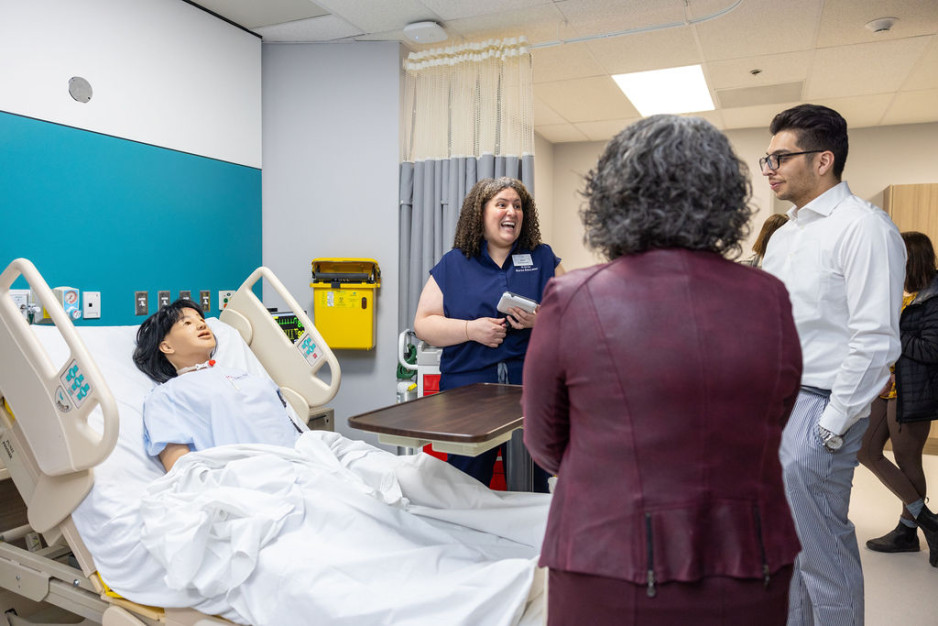Acquired Brain Injury: Inpatient Unit
Aging Brain and Memory Clinic
Allergy and Immunology Program
Amputee Rehabilitation Program
Biigajiiskaan: Indigenous Pathways to Mental Wellness
Learning by doing
Reem Gray and Amanda Thibeault are buzzing with excitement about the opening of the newly renovated Parkwood Simulation and Education Lab.
The bright and modern space is a project many years in the making that will transform training for staff. With donor support through St. Joseph’s Health Care Foundation, their project team has created a unique space that’s the first of its kind for the organization.
“Simulation-based training is crucial in building the capacity and confidence of staff,” says Gray, a Nurse Educator. “We have embedded simulation in so much of the education we’re doing, and the feedback from the frontline is that they’re enjoying it – and it’s sticking. They’re developing skills and feel more confident going to the bedside, which leads to better care.”
But in the past, there’s been one big roadblock to conducting training at Parkwood – there wasn’t a dedicated space for practising procedures and skills in real time.
Educators had been using two unused clinical rooms to conduct monthly orientation sessions for new staff and ongoing training on using new products, equipment and skills practice. The spaces were dated, and most of the simulation equipment was several years old.
For staff and the people they care for, this upgrade is so much more than just a renovation. “This provides a better learning experience and empowers educators by giving them the tools, equipment and space to deliver the best possible education aligned with best practices,” says Thibeault, Clinical Director, Complex Care Program.
The new space – formerly an under-utilized storage room – was unveiled with an open house where visitors had a chance to explore the equipment, hear from nurse educators and watch demonstrations.
Model patients
The project included renovations to create areas that mimic clinical rooms where staff can practise hands-on skills, a space to try medication dispensing and a modular classroom set-up with a smart TV for group learning, presentations and debriefs.
It’s outfitted with all the bells and whistles for simulation-based training, including a Nursing Anne – a highly realistic, fully programmable human model who simulates clinical scenarios a care provider might face on shift. This “model patient” mimics people receiving care for different needs, from stroke rehabilitation to mental health care, and educators can even speak through the replica to offer feedback in real-time.
To enhance the realism of learners even more, the team installed a central observation room where educators watch and direct from behind a two-way mirror. It creates a safe space where nurses can practice and hone their clinical skills before encountering patients.
The future of training is here
There are many ongoing challenges the lab helps to address, say Thibeault and Gray. Due to pandemic restrictions, many nurses entering the profession during the past few years have less hands-on experience and could benefit from intensive practice. The rising number of staff across St. Joseph's recruited with limited experience also increases the need for consistency in training.
The patients they’re seeing today are also more complex than ever before. “We have patients with more comorbidities now, which we weren’t seeing before, and people who have been in the healthcare system for a long time,” says Gray. It’s critical that frontline nurses have a baseline of strong clinical skills, because they need to provide both 24/7 care and act as a critical response team when people are in crisis.
The team has engaged educators across the organization to act as project champions and encourage other staff to take advantage of the dedicated space and new equipment. The primary users will be nursing staff, but they look forward to expanding the impact over time.
“I want to say thank you to the donors,” says Thibeault, acknowledging the impact of community support. “The Foundation has been such a strong supporter of this project, and we wouldn’t have been able to finish it without donors. That support means a lot.”











